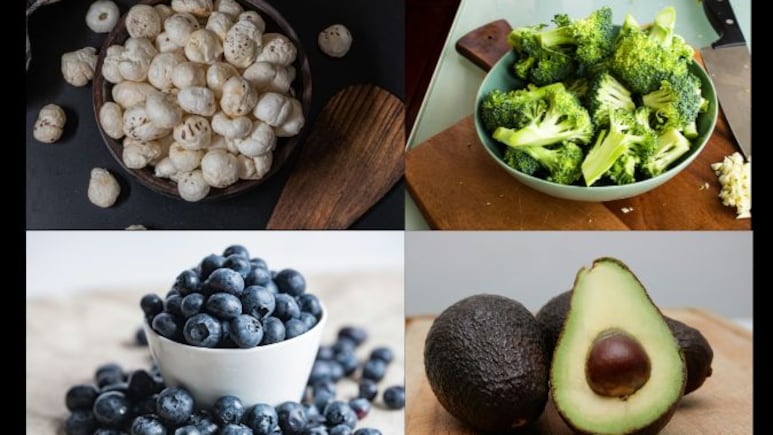
In the last few years, the term superfood has been going viral. This term has not only made a buzz on social media, but also taken over the aisle at your nearest grocery store.
From kale smoothies to chia puddings and turmeric shots, the Internet has made it seem like superfood is the ultimate key to good health, long life and improving our immunity and what not.
But... are they?
Dietitian Pranjal Kumat says that the term 'superfood' has no standardised scientific or regulatory definition.
"It isn't recognised by bodies like the FAO, US FDA, or FSSAI in India. It's simply a marketing term for foods believed to be especially rich in nutrients like antioxidants, polyphenols, or Omega-3 fatty acids," he adds.
So, while these foods might be nutritious, calling them super is a bit of a stretch.
Other experts also agree.
Why We Are All So Obsessed With "Superfoods"
It all comes down to how we consume information: quickly, visually, and often without digging too deep. We love a quick fix. And the term superfood gives just that illusion: one food to rule them all.
If you search online the definition of superfoods, you might end up with examples first. But after a little digging, you might find a series of headlines explaining how superfoods are foods that are nutritionally dense, containing lots of vitamins, minerals and antioxidants that are good for one's health.
According to experts, there are a few key reasons why this term caught on:
- It simplifies complex nutrition into one word
- It boosts product sales
- The Internet picks up small studies and amplifies them
- People are naturally drawn to shortcuts for better health
"It's reductionist and can be misleading. No one food can provide all nutrients or prevent disease. What matters is your overall diet, lifestyle, and context," he adds.
No Clear Definition
Debjani Gupta, Functional Nutritionist and Founder of Wellness for All, says, "There's no official definition of superfood. The term became popular in the 1990s to describe foods high in nutrients and believed to help prevent diseases. But there's no legal framework behind it."
She also points out that these foods are often nutrient-dense, but that doesn't make them miraculous.
"No single food is a magic bullet. A balanced, varied diet is the only real path to good health," she adds.
Remember, there's no official list, these are often hailed as 'super' in the mainstream:
- Berries: High in antioxidants and vitamin C
- Leafy greens - Kale, spinach, moringa: great for folate, iron, and more
- Seeds - like chia, flaxseed: rich in omega-3s
- Legumes: Beans, lentils: fibre and protein powerhouses
- Fatty fish: Salmon, tuna, omega-3 rich
- Turmeric: Known for curcumin, an anti-inflammatory compound
- Garlic: Believed to help boost immunity
- Green tea: Rich in antioxidants
- Nuts like almonds, walnuts, foxnuts: Healthy fats, protein, fibre
Where Did The Term Even Come From
Interestingly, the term 'superfood' wasn't coined by scientists or dieticians. It was actually introduced by the United Fruit Company in the early 20th century, to market bananas as cheap, healthy and practical.
Over time, the word made its way into mainstream media. And with the Internet and Influencer culture, it stuck.
"Superfoods often translate into super sales. The label can shift how people view and buy food, which can be risky if it blinds them to other equally nutritious but less-hyped food," says Gupta.
Why Superfood Is Not Equal To Super Health
Dr Tehseen Siddiqui, Chief Dietician at Saifee Hospital, points out that while these foods are nutrient-rich, the label can be misleading.
"The idea of a superfood promotes the belief that a few foods can 'fix' your health. It often makes people ignore their overall eating habits," he adds.
He adds that this kind of thinking can lead to limited diets, or the belief that expensive or exotic foods are better, when that's not necessarily true.
Simrat Kathuria, Celebrity Dietician and Wellness Coach, further adds, "The term 'superfood' is not scientific. It's a marketing language. These foods are often nutritious, yes, but they can't replace a full, varied diet."
She also reminds us that many traditional Indian foods are just as powerful, if not more, than globally hyped ones, "Amla, curry leaves, ghee, they're incredibly healthy, but don't get the 'superfood' title because they aren't pushed by big campaigns. Nutritional value, seasonal availability, and cultural relevance should matter more than buzzwords."
However, Dr Siddiqui puts a positive spin to this. He says that the trend has increased awareness about nutrient-rich whole foods. The key is not the label, it's understanding that a well-balanced, diverse diet is what really supports long-term health.
Bottomline
Instead of hunting for the next superfood seed or berry, the focus should be on putting together a well-rounded plate.
"People should look beyond labels. When you focus only on foods labelled 'super', you might ignore other essential nutrients or eat too much of one thing," Debjani Gupta.
Here are a few things that you can keep in your mind instead:
- Mix up your meals
- Eat locally and seasonally
- Choose real, whole foods
- Look at long-term balance, not short-term fixes
- Don't rely on one ingredient to solve everything
"If calling something a superfood helps people ditch processed snacks and return to real food, great. But don't lose sight of the bigger picture, health doesn't come from labels, it comes from consistency," Simrat Kathuria concludes.
To sum up, no food is actually a superfood. The label is clever, convenient, and catchy but that doesn't make it true. Experts suggest that health doesn't come from single ingredients. It comes from what you eat consistently, how you move, how you sleep, and how you live.
Track Latest News Live on NDTV.com and get news updates from India and around the world

